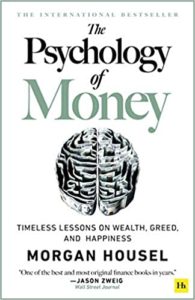There’s a new addition to the personal finance book hall of fame:
The Psychology of Money by Morgan Housel
Housel is an excellent finance writer and former columnist for The Motley Fool and Wall St. Journal. He currently blogs for the Collaborative Fund.
This is his first book. Its premise is simple.
Doing well with money has a little to do with how smart you are and a lot to do with how you behave. And behavior is hard to teach, even to really smart people.
It’s also important because Housel is correct, and most behavioral finance books are dry and repetitive. Once you learn the common biases to avoid, there isn’t much new or interesting in the space.
Until now.
Housel’s book has 20 chapters, each focusing on a soft skill by providing a real world story to introduce a concept before explaining the money lesson. He built it out from this post.
The stories are excellent, because Housel is a well-read guy who believes in multi-disciplinary learning.
Favorite Takeaways
 Defining Enough
Defining Enough
The hardest financial skill is getting the goalpost to stop moving. Modern capitalism is a pro at two things: generating wealth and generating envy. Perhaps they go hand in hand; wanting to surpass your peers can be the fuel of hard work. But life isn’t any fun without a sense of enough. Happiness, as it’s said, is just results minus expectations.
My experience as an advisor has been that people who can define enough for themselves versus in comparison to their peers are happier and make better financial decisions.
Buffett’s Secret of Success
Warren Buffett is a phenomenal investor. But you miss a key point if you attach all of his success to investing acumen. The real key to his success is that he’s been a phenomenal investor for three quarters of a century. Had he started investing in his 30s and retired in his 60s, few people would have ever heard of him.
$81.5 billion of Buffett’s net worth came after his mid-sixties. The Psychology of Money estimates that if Buffett had started investing at 30 (instead of 10) and retired at 60, but generated the same returns his net worth would be 99.9% less.
Start early, invest, let your investments compound, and don’t interrupt the compounding machine by spending too much, rushing it, or making behavioral mistakes.
And stay healthy so you have the energy to pursue your interests for a long time.
The Price for Market Returns
Like everything else worthwhile, successful investing demands a price. But its currency is not dollars and cents. It’s volatility, fear, doubt, uncertainty, and regret—all of which are easy to overlook until you’re dealing with them in real time.
The market provides a hassle-free return. You don’t have to work for it. You have to avoid things which are hard to avoid. We’ve heard market timing admonitions before and for good reason. Housel’s is unique in that he goes on to explain that trying to get the market’s return without the risk by sidestepping markets and trying to jump back in is a shortcut that won’t consistently work because you are trying to avoid the price to be paid for the market’s returns.
Optimism Rules
Optimism is the best bet for most people because the world tends to get better for most people most of the time. But pessimism holds a special place in our hearts. Pessimism isn’t just more common than optimism. It also sounds smarter. It’s intellectually captivating, and it’s paid more attention than optimism, which is often viewed as being oblivious to risk.
This chapter was worth the entire experience of reading the book. Critics sound smarter than cheerleaders, and in a stressful arena like investing smart arguments easily push us off our long-term plan. No one gets on TV by talking about patience. Even I have to admit that would be the world’s most boring segment. Gloom and doom sells. And it causes us to react when we shouldn’t.
And I have really just skimmed the surface of the book’s lessons. I can’t recommend The Psychology of Money highly enough. It’s a short read, packed with great information that will make you a better investor.


